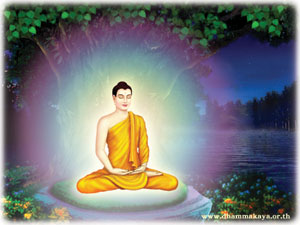I have definite opinions. They’re idiosyncratic, but usually carefully considered. Take my stance on the Buddha, whom I revere. I’ve had palpable experiences during meditation of the Buddha’s radiant compassion. The Buddha is enlightened and I am not. Still, as much as I sense the holiness of this archetypal being, I think the human Gautama made a mistake when he abandoned his wife and child to seek enlightenment. God and liberation are eternal; They would have waited for Gautama’s child to go off to college and his wife to start a career as a caterer so she wasn’t stuck with empty nest syndrome. Maybe this life is an illusion, but the illusion must be lived with integrity.
The householder bears the burden of liberation. It’s we who live in the mundane world with jobs, snotty teenagers, and ex-spouses who snipe over money, who have the most exquisite task: melting into communion with the divine despite the entangling web of responsibilities, obligations, and relationships. Anyone can get enlightened meditating all alone in a cave. That’s Gut 101, science for English majors with a guaranteed A, the easy way out.
Writer’s colonies perpetuate the same myth: that the work should be separate from daily life. That you need to leave the world behind in order to create. Bull manure. A writer writes. A writer carves out space in his or her messy, hectic, ragged, intervening life to write. It becomes a ritual, a discipline, a practice. It’s the journey that counts. When artists and writers stop thinking of themselves as precious children who need to be coddled in order to produce, there will be better quality art and writing.
Now, because I am a householder with a teenager who thinks I am wrong 95% of the time, I get challenged a lot. My oldest daughter yelled at me recently about my opinions on Chinua Achebe.
“Mommy, white people can’t criticize anything black people do!” she scolded me. She’s taking an African-American literature course in school; right now, she is very sensitive to the sad plight of black writers and to what African Americans have endured. I didn’t respond because there’s no point. Currently this daughter is convinced that I am an unredeemed idiot. But it did make me wonder.
Am I supposed to praise every work that comes from a black author or artist, simply because they are black and I am white? (Mostly white; there’s quite a lot of Native American blood in my lineage.) Does this chicanery really help black people achieve the parity of opportunity and circumstance that they’ve been denied because of race? It’s unconscionable that these inequities have caused so much suffering throughout history. Yet it feels to me that pretending that “Things Fall Apart” is a great novel actually detracts from the accomplishments of authors such as, say, Maya Angelou, whose work makes my soul sing. I put her in the same literary category as Yeats and Rumi, and in the larger artistic category with Giotto, Da Vinci, Michelangelo, Brunelleschi, and Caravaggio: these artists exalt, uplift, redeem. Well, in Caravaggio’s work, the spirit is rotting, so redemptive isn’t the appropriate word. Nonetheless, I am so compelled to have a relationship with his work because of its virtuosity that I place him in the elite.
And it isn’t just Chinua Achebe whose work I have criticized. I am an equal opportunity disliker of bad literature. Dan Brown is one of the worst writers of prose to come along in a century. His success just shows how powerful story is, even when told so badly it makes you want to vomit. This said, I do hope my novel IMMORTAL makes 10% as much money as Brown’s book did. And the fact that Leonardo is mentioned in the first paragraph of IMMORTAL certainly helped my novel get picked up by a publisher at a time when the the mania over Brown’s badly-written novel was at its peak.



Living an illusion with
integrity is a neat idea.
Terry Finley
http://terryrfinley.bravehost.com/